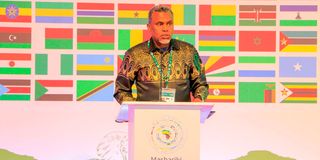
National Intelligence Service Director General Noordin Haji delivers his speech during the second Mashariki Cooperation Conference he held in Naivasha, Nakuru County on April 3, 2025.
Countries don’t become great by accident. None has, and none ever will. I’ve said before, and repeat here, that the imagination of elites has everything to do with what a country becomes. It’s not that common citizens aren’t the engine of greatness.
They are, but the elite must create the conceptual and material conditions sine qua non for prosperity.
An elite that can’t create a zeitgeist – an irrefutable national consensus on what the state that it superintends must be – will never lead a country to lofty heights. That’s why the historic landmark speech given by NIS Director General Noordin Haji last Thursday is a blockbuster milestone according to those who conceptually understand the yeoman task of nation-building. It was attended by high officials, civil society, the press, and ordinary Kenyans.
Mr Haji’s lecture “Kenya’s Evolving Security Landscape” was a first for the NIS and the country. I submit the lecture was no accident. Mr Haji is among one of the most erudite public servants. The man is unassuming, though he’s endowed with a very complex and literate mind.
He’s learned. He’s a philosopher in the finest traditions of pan-Africanism. Unlike many simpletons who huff and puff about their thin credentials, Mr Haji boasts one of the richest curricula vitae in the republic. In a word, he’s a man of letters. Professional to a fault, he prepares meticulously. We can all be sure that Kenya’s security is in the safest of hands with him.
Last year in the storm of the Gen Z protests, now disgraced Deputy President Rigathi Gachagua launched an unforgivable attack on Mr Haji. I knew then Mr Gachagua had zero understanding of his weighty responsibility as DP. Not to mention Mr Gachagua didn’t have an iota of understanding of his responsibilities as the second in command within the state structure.
My belief is Mr Gachagua’s vitriol against Mr Haji was because the latter was from the “wrong” ethnic group. Mr Haji is the first Kenyan Somali to hold the sensitive docket since independence. Only Kikuyu, Kalenjin, and Kamba men have held it before. Yet Mr Haji, the first civilian to hold the job, is also the most qualified DG to do so.
I digress. Even though it’s imperative to emphasize that Mr Haji is more Kenyan than many public servants. He literally grew up and attended school in many parts of Kenya because his father’s public service relocated him to virtually all regions of the country. Few senior officials can boast of such intimate knowledge of Kenya. This is why when Mr Haji speaks about the security and integrity of Kenya we need to take him very seriously.
His DNA is Kenyan, not tribal. I believe the speech, which I have seen, reflects the man’s identity as one who would pay the ultimate price to keep Kenya safe. To do so, he believes that the gulf between the state and the citizen must be infinitesimal.
For this reason, Mr Haji’s lecture dwelt on the necessity for the NIS to be more public facing to reduce the deficit of trust between the state and the people. I heard him to be saying that transparency is the secret sauce of democracy. That the NIS where necessary will act in secrecy without being secretive. Secrecy isn’t necessarily negative but being secretive may be. A national security agency that is open and accessible to the public, one that dialogic with citizens, is more effective than one that’s completely opaque and which is feared by the people. That’s because people are afraid of state institutions that operate secretively without the public knowing a lick about their purposes, structures, and goals.
It’s not enough for NIS to just say “trust me.” It needs to show the public “the beef.” Mr Haji’s showed the thinking of NIS to Kenyans for the first time ever. Importantly, he assured Kenyans that its secret service isn’t asleep at the wheel – that it’s engaging with an ever-expanding myriad of deadly threats from international organized crime, economic espionage, geopolitical shifts and their impact on Kenya, climate change, artificial intelligence, terrorism, democratic stability, and national cohesion. It’s also keenly attuned to securing opportunities for Kenya’s prosperity. I am comforted that the NIS of today isn’t the feared Special Branch of yesterday that hounded me into exile for opposing the KANU dictatorship.
I commend Mr Haji for leading this needed transformation and bringing into full bloom the National Intelligence Research University, the venue for the his lecture. Finally, let me come to the defence of the Chief of General Staff General Charles Muriu Kahariri who’s unfairly been lambasted by political hacks for saying the obvious – in a democracy, regime change comes only through constitutional elections. He reiterated the political impartiality of the military and its commitment to the permanence of the state. It’s wrong to twist his words for political mileage. Let’s focus on the core message of Mr Haji’s lecture.
Makau Mutua is SUNY Distinguished Professor and Margaret W. Wong Professor at Buffalo Law School, The State University of New York. @makaumutua.









